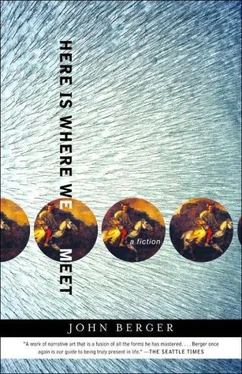With these words and a jerk of their arms, they threw the couple high into the air. We craned our necks to watch. They were close together. Their hands could touch or reach each other’s sex. Her skirt billowed in the form of a nimbostratus cloud and covered Mirek’s feet. One of Mirek’s hands, beyond his head, searched to turn down the sound. Imperceptibly, the two of them descended together into the waiting Gurali arms, there to be gently received, before being launched once more. They hung in the air a little longer each time.
A few hours later, at 11 a.m., the just-married and thirty wedding guests met in the main square. Most of us were licking the ice-cream cornets which are famous in Nowy Targ. Then we set off to look at a lake that is called the Eye of the Sea. Morskie Oko.
What happens is more surprising than what’s invented.
In Nowy Targ during the early eighties two friends were working in the shoe factory. The family name of one of the men was Bieda, which means poor, and that of the other was Bocacz, which means rich. One day, after a trade union meeting — Solidarność was just beginning — they were picked up by a Zomo patrol. Zomo was the counter-insurgency police. They were asked their names. Bieda declared his and was smashed over the head for insolence. It was Bocacz’s turn. Name? I don’t have a name. So you don’t have a name, eh? And he was smashed over the head for insolence. Give me your name! Bocacz. I see, so you’re in this together, both of you, it’s clear, said the Zomo sergeant. Poor and Rich! And they were put in a cell until they told the truth.
The walk through the forest up to the lake took three hours. Because it was summer, many people of all ages were making the same walk. When we arrived, we sat on boulders by the edge of the lake and gazed across the very still water towards the peaks. In the direction we were looking there was nothing man-made. The thousand people around us were very quiet — as if attending a performance. We munched sandwiches. Danka fed Olek. Mirek pointed to where he thought it would be possible to tickle trout. Under those rocks, he declared in his poacher’s whisper. Everybody had the air of being made happy by what they had come to see. Which was what exactly? Was it the Jurassic mountain range and its reflection in the lake? Or was it the stillness of the water with its lips at the edges which never quivered?
I ask myself this as I empty the śmietanie, the sour cream, into a bowl in the kitchen. The sourness of śmietanie makes it taste less of milk and more of sex. I think we all went to Morskie Oko to look at what time does without us.
The following day, on the grassy banks of the White Dunajca, we built a fire and buried potatoes in the earth to bake them, in the same way that clay bowls, which last for centuries, are baked. The potatoes we ate hot with salt from Wieliczka and horseradish from Danka’s mother’s garden.
Night’s falling. Something must have delayed them. I could telephone Mirek on his mobile and I don’t. I prefer to wait, as this house without a doorstep does. I move into the room with the swing and the armchair.
With a little psst! the reading lamp on a table in the far corner goes out, probably the bulb, which I won’t be able to replace. On the table are a pile of yellowed newspapers, some of them dating from the 1970s, a hand-compass that Mirek perhaps used when he was starting out as a forestry engineer, and a coffee tin, with nails in it. The table has a drawer and I open it with the stupid hope that I may find a light bulb, which I’ll try in the lamp. There are only books, Polish novels. Underneath them, at the bottom of the drawer, is a thin pamphlet with a photograph of a woman on its cover. I naturally recognise her, her eyes with their expression of looking through an opaque wall at what lies behind it, their expression of surprised pain and sustained determination. I see the slight limp of her walk, and I hear her voice, speaking in Polish, German, Russian, the voice of the eighteen-year-old who fled Warsaw because she was going to be arrested by the Czarist police, the young voice she never lost, even when her words were like those of a venerable prophet. Rosa Luxemburg. She was first introduced to me when I was sixteen, more than twenty years after her death. She was born in nearby Zamość where Bogena goes to argue with the authorities (in vain) about her father’s pension.
Who knows how the pamphlet, entitled Centralism and Democracy, ended up here? To add to the improbability it’s in French. Yet she, her writings, her imagination were accustomed to clandestinity and clandestine travelling. They expected to be hidden in remote drawers.
The last paragraph of the pamphlet, written in 1904, argues like this: For the first time in history, the workers’ movement in Russia has the chance of really becoming the instrument of the popular will. Yet look! The ego of Russian revolutionaries has made them lose their minds and talk yet again of an almighty historical leadership residing in His Highness, The Central Committee. They stand things on their heads and don’t realise how the only legitimate subjectivity for any revolutionary leadership today is the ego of the working class, who want the right to make their own mistakes and to learn for themselves the dialectics of history. Let’s be clear. The mistakes made by a revolutionary workers’ movement are historically infinitely more precious and fecund than the infallibility of any so-called Central Committee!
Outside it is entirely dark and I hear, in the distance, the chattering of a nightjar. Seated on the swing, wearing black high lace-up shoes of thin leather, could be goatskin, with heels that are not flat — some German comrades found her choice of footwear odd — Rosa makes the swing oscillate with the regularity of a tall clock’s pendulum, covering the same minimal distance of twenty centimetres back and forth, no more.
To recall and recall again the circumstances of her death. In the last days of December 1918 she and Karl Liebknecht founded the German Communist Party. Two weeks later they were arrested in Berlin and taken to the Hotel Eden where they were interrogated, beaten up and bundled into a vehicle supposedly to be transferred to the prison of Moabit by cavalry guard officers. In reality they were taken to the Berlin Zoo and slaughtered. She had her head smashed in, and her body was thrown into the Landwehr canal.
I glance at the swing, and her abundant thick hair.
The Berlin Zoo is not far from the Botanical Gardens. From a prison cell in Wroclaw, seven months before her death, Rosa wrote to Sophie Liebknecht.
Sonitschka, your letter gave me so much joy and I reply immediately. Now you see the pleasure and comfort a visit to the Botanical Gardens can give! You should do it more often. I share your pleasure when you describe so vividly your impressions. Yes, I know those wonderful catkins of pines that are ruby-red when the trees are in flower. Those red catkins are the female flowers from which the cones are born, the cones that become so heavy they drag the branches down towards the ground. Beside them are the less obvious male flowers of a pale yellow, from which comes a golden pollen. Unfortunately, from my window here I can only see the foliage of some distant trees, can just glimpse their tops on the other side of the wall. I try to guess by the colour and the little I can see of the form, what kind of tree each one is, and I believe that, on the whole, I hardly make a mistake.
The swing is totally still now and the slatted seat hangs at an angle to the floor, as if it had never moved or been sat upon.
Tomorrow I will do a drawing of a clematis which climbs up a pear tree behind the house. Its pears, when ripe, are reddish, and their flesh tastes slightly of juniper berries, their skins of slates in the rain.
Читать дальше












